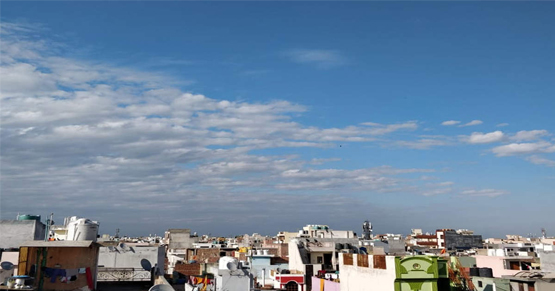
When Prime Minister Narendra Modi imposed a nationwide lockdown a week ago, it was designed to stop the imminent spread of the novel Coronavirus.
But grinding this country of 1.3 billion people to a near halt has also provided a surprising temporary solution to another pressing health issue – alarmingly high pollution levels.
The world’s largest lockdown means all factories, markets, shops, and places of worship are now closed, most public transport suspended and construction work halted, as India asks its citizens to stay home and practice social distancing. So far, India has more than 1,900 confirmed cases of Covid-19, including 50 deaths.
Already, data shows that the main cities are recording much lower levels of harmful microscopic particulate matter known as PM 2.5, and of nitrogen dioxide, which is released by vehicles and power plants.
PM 2.5, which is smaller than 2.5 micrometers in diameter, is considered particularly dangerous as it can lodge deep into the lungs and pass into other organs and the bloodstream, causing serious health risks.
The sudden fall in pollutants and the subsequent blue skies signal a dramatic shift for India — which has 21 of the world’s 30 most polluted cities, according to the IQAir AirVisual’s 2019 World Air Quality Report.
In the capital, New Delhi, government data shows the average concentration of PM 2.5 plunged by 71% in the space of a week — falling from 91 microgram per cubic meter on March 20, to 26 on March 27, after the lockdown began. The World Health Organization considers anything above 25 to be unsafe.
The data from the Central Pollution Control Board (CPCB), part of India’s Environment Ministry, was collated by the Centre for Research on Energy and Clean Air (CREA).
Nitrogen dioxide went from 52 per cubic meter to 15 in the same period — also a 71% fall. Mumbai, Chennai, Kolkata and Bangalore have also recorded a fall in these air pollutants.
The average AQI in Delhi, which hovered around 195 in 2019, which was more than six times the safe limit prescribed by the WHO, stands now at around 88, which is the moderate level. In fact on Saturday it plunged to 42, making the city’s air “good” according to WHO standards for the first time in over a year.
“ COVID19 is indeed a blessing in disguise. We find that the environment seems to be on its correction mode, using this unforeseen opportunity,” says environmentalist and founder of Green Circle, V Selvarajan. “The way AQI and PM 2.5 indicators respond makes it obvious that the AIR needed this break, though we may feel uncomfortable,” he adds
He also implies that the improved air quality is obviously due to controlled vehicular traffic on the one hand and stoppage of construction activities on the other. “Though people do not go out to get the benefit of fresh air, just a few minutes relaxation in balconies would make one feel the fresh air,” opines Selvarajan.
The fact the stoppage of the operation of flights means that Aircrafts stopped spilling aerofuel, which is one of the main pollutants. “Delhi is predominantly affected by carbon monoxide and particulate matter in normal days. This is now evident that they are almost negligible,” he further adds.
Another unique thing that happened during the lockdown is that the streets usually filled with people, are now seeing wildlife coming into the urban cities. In a recently released video, a nilgai was seen roaming around in front of the Great Indian Place Mall in Noida. A herd of deers was also spotted near Noida Sector 91. In the streets of Trivandraum , a rare species of civet cat was also seen roaming around the streets, while a herd of reindeers was seen on the streets of Hardwar.
“The main reason for this is the fact that there is little to no human movement on the roads,” says Selvarajan. The intruding of peacocks and nilgais from urban forests and green areas clearly indicate the habitat destruction and lack of food. “They take the god given opportunity to explore new areas,” he adds.
“The pointer here is that mankind didn’t care for nature and destroyed the habitats. Time to act positively and save nature for our own end,” concludes Selvarajan.
Police rescue three-year-old from kidnapper in Ashok Vihar; factory worker arrested
Doctors say early diagnosis, IVF and specialised high-risk care helped ensure a safe delivery despite…
Police arrest a 19-year-old and four juveniles for allegedly stabbing a 25-year-old in retaliation for…
Batting coach Sitanshu Kotak backs struggling opener Abhishek Sharma and No.3 Tilak Varma, saying there…
Delhi High Court grants bail to man accused after former partner’s suicide, says mere breakup…
Heroin worth Rs 6 crore seized in Dilshad Garden; 23-year-old peddler with alleged family links…